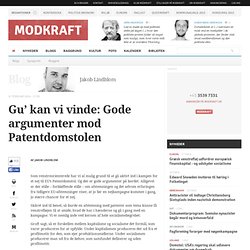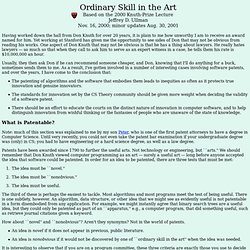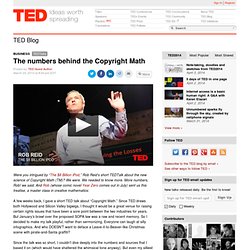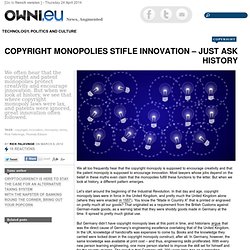

Gu’ kan vi vinde: Gode argumenter mod Patentdomstolen. Som venstreorienterede har vi al mulig grund til at gå aktivt ind i kampen for et nej til EU’s Patentdomstol.

Og der er gode argumenter på bordet. Alligevel er der stille – forbløffende stille – om afstemningen og det selvom erfaringen fra tidligere EU-afstemninger viser, at jo før en nejkampagne kommer i gang, jo større chancer for et nej. Gu’ kan vi vinde: Gode argumenter mod Patentdomstolen. Editorial: Why Games Should Enter The Public Domain. By John Walker on February 3rd, 2014 at 1:00 pm.

A few days ago I inadvertently caused a bit of a fuss. In writing about GOG’s Time Machine sale, I expressed my two minds about the joy of older games being rescued from obscurity, and my desire that they be in the public domain. This led to some really superb discussion about the subject in the comments below, and indeed to a major developer on Twitter to call for me to be fired. Hvad kan man med et patent ? Hvad er et patent egentlig ? Internetpartiet.nu. Internetpartiet.nu. Reference Material. Science History and the Future. Ordinary Skill in the Art. Having worked down the hall from Don Knuth for over 20 years, it is plain to me how unworthy I am to receive an award named for him.

Yet working at Stanford has given me the opportunity to see sides of Don that may not be obvious from reading his works. One aspect of Don Knuth that may not be obvious is that he has a thing about lawyers. He really hates lawyers --- so much so that when they call to ask him to serve as an expert witness in a case, he tells them his rate is $10,000,000 an hour. Usually, they then ask Don if he can recommend someone cheaper, and Don, knowing that I'll do anything for a buck, sometimes sends them to me.
As a result, I've gotten involved in a number of interesting cases involving software patents, and over the years, I have come to the conclusion that: Victory Lap for Ask Patents. By Joel Spolsky Monday, July 22, 2013 There are a lot of people complaining about lousy software patents these days.

I say, stop complaining, and start killing them. It took me about fifteen minutes to stop a crappy Microsoft patent from being approved. Nej til EU patenter: Derfor. Nokia har lige fået nedlagt fogedforbud mod alle HTC Android baserede devices i Tyskland, på basis af patent EP1148681.

Det er præcis et skolebogseksemplet på hvorfor jeg ikke kan stemme for en EU patentret. For det første er det et klokkerent software patent. New Zealand just abolished software patents. Here’s why we should, too. What's wrong with the patent system?

Most people cite problems with patent trolls or low patent quality. But a recent study by the Government Accountability Office makes it clear that the real problem is more specific: Patents on software don't work. Copyright's Three Lines Of Defense. Copyright Monopoly – Johnny Olsson I’ve followed and participated in the copyright debate for years, and I’ve come to realize there are certain patterns that repeat themselves. You can roughly say there are three lines of defense: One that appeals to emotions, one that appeals to pragmatism, and one that appeals to a sense of responsibility. I’m going to take this opportunity and try to break them down. The first line of defense is the artists, sent out like cannon fodder to appeal to our emotions. The stories of the talented artists who pour their souls into their work and can’t make a decent living out of it are always heartbreaking. The second line of defense is the industry itself. The third line of defense is the claim “without copyright, there will be no culture”.
Of course, this is complete and utter bullshit. The simple explanation is that expressing oneself is a far more important drive than money. Copyright was never about guaranteeing the artists pay. The numbers behind the Copyright Math. Were you intrigued by “The $8 Billion iPod,” Rob Reid’s short TEDTalk about the new science of Copyright Math (TM)?

We were. We needed to know more. More numbers, Rob! Copyright Monopolies Stifle Innovation – Just Ask History. We all too frequently hear that the copyright monopoly is supposed to encourage creativity and that the patent monopoly is supposed to encourage innovation.

Most lawyers whose jobs depend on the belief in these myths even claim that the monopolies fulfill these functions to the letter. But when we look at history, a different pattern emerges. Let’s start around the beginning of the Industrial Revolution. In that day and age, copyright monopoly laws were in force in the United Kingdom, and pretty much the United Kingdom alone (where they were enacted in 1557). You know the “Made in Country X” that is printed or engraved on pretty much all our goods? But Germany didn’t have copyright monopoly laws at this point in time, and historians argue that was the direct cause of Germany’s engineering excellence overtaking that of the United Kingdom. There are more examples.
Thomas Edison & Henry Ford.